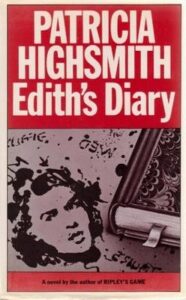Ediths Tagebuch [Edith’s Diary] ** (1983, Angela Winkler, Vadim Glowna, Leopold von Verschuer) – Classic Movie Review 12,875
Angela Winkler won the Best Actress award at the Venice Film Festival for the 1983 German psychological thriller film Ediths Tagebuch [Edith’s Diary]. Patricia Highsmith hated the film of her admired novel: ‘a lot of oedipal crap’.
The 1983 West German psychological thriller film Ediths Tagebuch [Edith’s Diary] is wildly deranged and melodramatic, throwing all the subtlety and much of the intelligence of Patricia Highsmith’s source novel out of the window, with appalling characters you can’t connect with, let alone identify with. A heavyweight Germanic touch near destroys it.
Highsmith hated the film, calling it ‘dreadful’ and said: ‘Making the son in love with the mother is a lot of Oedipal crap.’ And she is right. However, when she’s allowed to be, Angela Winkler, who plays the title character and fantasist diarist Edith, is really rather good in her portrait of increasing madness and descent into psychosis. Indeed she won the Venice Film Festival.
When Edith Baumeister’s husband (Vadim Glowna) abandons her for a younger woman, his pretty 26-year-old secretary Katharina Ems (Sona MacDonald), leaving the mentally fragile Edith with their alcoholic teenage son (Leopold von Verschuer) and his sick senile war-mongering uncle, she begins a descent into madness, recording imaginary details of a much more successful life in her diary.
Hans W Geißendörfer writes an over-dramatic screenplay, seemingly not trusting the material, maybe thinking it was too dull or too cerebral to make a popular thriller movie, delivers hysterically pitched scenes, and encourages some shocking over-acting from his players. Vadim Glowna and Leopold von Verschuer are not really at all good as Edith’s husband and son, but, to be fair, they are playing repellent roles repellently.
There are basically only three roles in the film: Angela Winkler as Edith Baumeister, Vadim Glowna as her husband Paul Baumeister, and Leopold von Verschuer as her son Christian ‘Chris’ Baumeister. The other characters are mere cyphers, so for example Fassbinder star Irm Hermann is totally wasted as Edith’s friend and neighbour Sabine Angerwolf.
Nevertheless, there are some good scenes and ideas along the way, with some strong highlights, and the film is interesting enough to suggest there is a good film trying to get out from out of the mess here. It is not a thriller, but. as usual with Highsmith, there is a murder, though its significance for the plot and the characters is negligible, and also a death, which is significant.
It is shot by Michael Ballhaus and is scored by Jürgen Knieper, important contributions to the film.
The cast are Angela Winkler as Edith Baumeister, Vadim Glowna as Paul Baumeister, Leopold von Verschuer as Christian Baumeister, Hans Madin as George, Irm Hermann as Sabine Angerwolf, Wolfgang Condrus as Berno Angerwolf, Sona MacDonald as Katharina Ems, Friedrich G Beckhaus as Dr Bleibig, Werner Eichhorn as Dr Starr, Michaela Gries as Annemarie, Beate Tober as Helga, and Pierre Clémenti.
Highsmith approved of Hans W Geißendörfer’s 1978 film version of her book The Glass Cell, Die gläserne Zelle, but she hated the changes he made when he went on to adapt her novel Edith’s Diary.
Edith’s Diary is a 1977 psychological thriller novel by Patricia Highsmith, the 17th of her 22 novels, a study in dislocation and obsessive diary writing. Edith, of course, is based on Highsmith herself. It is another book that had a troubled history: American publishing house rejected it in 1976, apparently because of its failure to fit into recognisable genres of crime, suspense, mystery, or even traditional fiction.
At the start of the novel the mother is a middle-aged woman, with a 10-year-old son, whereas Angela Winkler is a still young-seeming woman and Leopold von Verschuer an old-seeming teenager, who could be in love with her. It’s a different story. Geißendörfer picks bits and pieces of the novel from here and from there, mixes them up, jumbles them together, and gets his mess of movie. Of course, arguably, the novel is unfilmable as it is. The story begins in the late 1950s and moves on to 1965 when the husband abandons Edith for a younger woman. Perhaps understandably, Geißendörfer abandons this time scale, too awkward for a movie.
Ediths Tagebuch is directed by Hans W Geißendörfer, runs 102 minutes, is made by Geißendörfer Film- und Fernsehproduktion (GFF), Pro-ject Filmproduktion, Roxy Film and Zweites Deutsches Fernsehen (ZDF), is released by Filmverlag der Autoren , is written by Hans W Geißendörfer, is shot by Michael Ballhaus, is produced by Rolf M Degener (executive producer), Hans W Geißendörfer, Willi Segler and Luggi Waldleitner, and is scored by Jürgen Knieper.
Release date: September 23, 1983 (West Germany).
The Lost Honour of Katharina Blum (1975) and The Tin Drum (1979) made Angela Winkler a star. More recently, she appeared as Miss Tanner in Luca Guadagnino’s Suspiria (2018).
Highsmith films: Strangers on a Train (1951), Purple Noon (1960), Enough Rope (1963), Once You Kiss a Stranger (1969), The American Friend (1977), This Sweet Sickness (1977), A Dog’s Ransom (1978), Die gläserne Zelle [The Glass Cell] (1978), Deep Water (1981), Edith’s Diary (1983), The Cry of the Owl (1987), The Story Teller (1989), Once You Meet a Stranger (1996), The Talented Mr Ripley (1999), Ripley’s Game (2002), Ripley Under Ground (2005), The Cry of the Owl (2009), The Two Faces of January (2014), Carol (2015), A Kind of Murder (2016), Deep Water (2022), Ripley (2024).
© Derek Winnert 2024 – Classic Movie Review 12,875
Check out more reviews on http://derekwinnert.com



